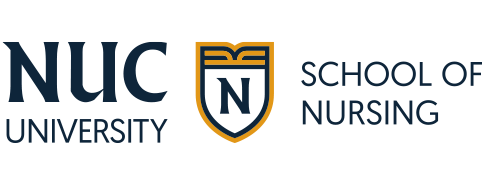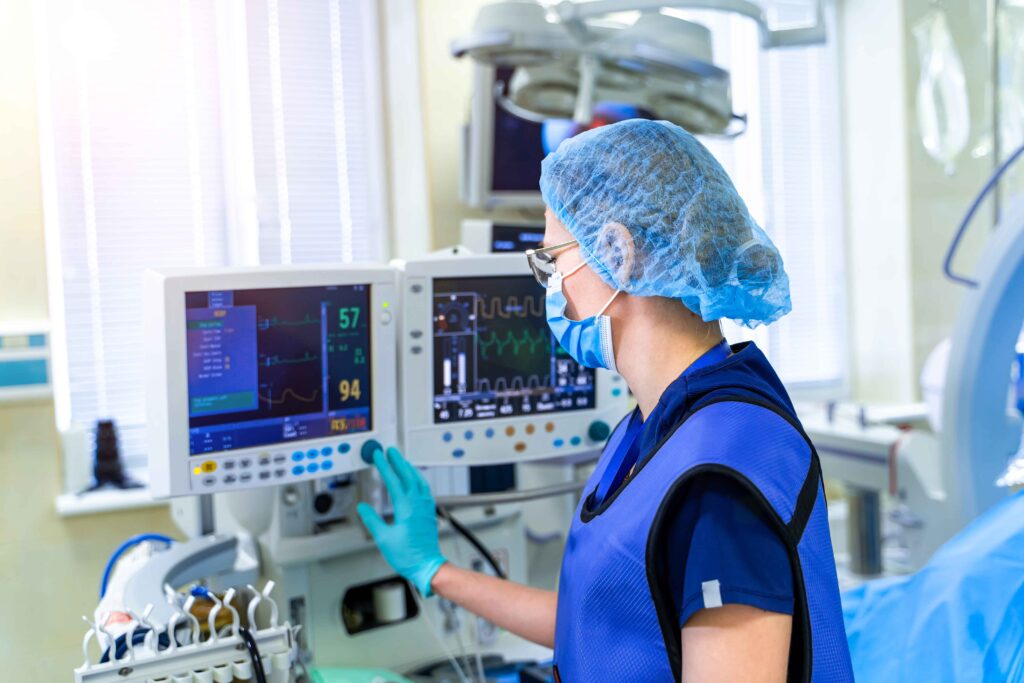Technology has long played a vital role in the modern healthcare industry. That said, emerging healthcare technology proves that digital devices and data analysis will continue to play an increasingly powerful role in delivering effective healthcare services to patients.
Students considering enrolling in an ASN degree program should be aware of the latest technology trends and should opt for a degree program that introduces them to the most advanced healthcare technology.
The Role of Technology in Modern Healthcare
Technology is no longer considered a supplemental tool when providing healthcare services. In fact, most physicians, nurses, and healthcare providers rely on advanced technology every day to improve operational efficiency in clinical settings, evaluate and diagnose patients, and provide personalized care. Nursing technology advancements have revolutionized the healthcare landscape, allowing nurses and most healthcare providers to offer enhanced care and improved patient outcomes.
Overview of Technology’s Impact on Patient Care
The American Nurses Association notes that healthcare technology has had a positive impact on patient care in several ways, including:
- Improving communication and enhancing patient privacy.
- Providing patients with easier access to their medical records.
- Reducing the barriers that exist that prevent providers from achieving health equity.
- Improving operational efficiency and ensuring that nurses are not overburdened by their patient caseload.
Essential Technology Trends for ASN Students
Technology in nursing education is crucial for preparing future nurses with the technical and digital skills needed to work in a rapidly evolving, tech-driven healthcare system.
These are the essential healthcare technology trends that you should be aware of as an ASN student:
Telehealth and Remote Patient Monitoring
Social-distancing requirements and protocols that were put in place during the COVID-19 pandemic required doctors and nurses to quickly adapt to advanced telehealth technology and remote patient monitoring services. Research published in the Nursing Clinics of North America Journal states that telehealth technology became an essential tool during the global pandemic, but it continues to be a key technology solution in the healthcare industry today. Telemedicine in nursing allows nurses to provide patients with care remotely, either through phone call consultation or videoconferencing appointments. It helps to improve accessibility as well as patient outcomes.
Electronic Health Records (EHR) and Data Management
Most healthcare providers around the country exclusively rely on electronic health records (EHR) to manage records and communicate with patients. Electronic health records training is an essential component of any nursing degree program, as nurses in all types of nursing positions will be required to work frequently with electronic health records systems.
Artificial Intelligence (AI) in Diagnostics and Treatment
Artificial intelligence, which is commonly referred to as AI technology, is revolutionizing nearly every industry, including the healthcare industry. One of the most significant applications of AI technology in the healthcare industry is through diagnostics and imaging. Nurses and other healthcare professionals are now able to rely on AI-assisted technology to improve diagnostics and ensure that patients receive an accurate diagnosis as well as an effective treatment plan as quickly as possible.
Mobile Health (mHealth) Apps and Patient Engagement
Mobile health apps, or mHealth apps, are apps that can be used by both providers and patients, ultimately connecting the two parties together through their preferred mobile devices. The leading healthcare apps for nurses include:
- GoodRX Pro
- Epocrates
- Medscape
Emerging Technologies on the Horizon
As new and experienced nurses continue to learn how to leverage the most advanced healthcare collaboration tools, it’s important to keep in mind that there are always new nursing technology advancements on the horizon. Emerging healthcare technology shows plenty of promise and potential, ensuring that patients will continue to receive precise and effective care in the years to come.
Some of the emerging technologies on the horizon include:
Virtual Reality (VR) and Augmented Reality (AR) in Training
Virtual reality and augmented reality are beginning to influence the healthcare training landscape, allowing nurses to develop new and advanced clinical skills in simulated settings. Healthcare simulation technology can help improve precision as nurses perfect their clinical skills, all while improving patient safety and outcomes.
Robotics in Patient Care
While it may sound a bit dystopian, robotics is actually playing a powerful role in improving patient care and reducing burnout rates among nurses. The use of robotics in nursing is becoming more common, with potential applications including:
- Robotic devices that can help lift elderly or injured patients, reducing the physical strain placed on nurses.
- Robotic devices that can communicate directly with patients.
- Robotic devices that can transport medical equipment, supplies, and lab samples safely around clinical settings.
Wearable Health Tech and Biometric Monitoring
Wearable health tech devices enable providers to implement remote patient monitoring services as well as biometric monitoring, which is becoming increasingly important for genomics and precision medicine. In the years to come, healthcare providers are likely to become more reliant on wearable health technology, as it is one of the best ways to provide patients with data-backed, personalized care.
Challenges and Ethical Considerations in Healthcare Technology
While emerging healthcare technology often showcases promise and potential, there also are challenges and ethical considerations that nurses and providers need to be aware of.
Some of the primary ethical concerns surrounding healthcare technology include:
Balancing Technology With Personalized Patient Care
Technology will likely play a key role in healthcare in the coming years. However, nurses and other professionals must continue using it as a supplement to deliver the compassionate, personalized care patients expect.
Risks of Over-Reliance on Technology
Technology helps to streamline processes and improve operational efficiency at healthcare facilities, but over-reliance on technology can pose several risks, such as:
- Introducing unintended biases in healthcare settings, which could affect the accuracy and fairness of patient care.
- Using ineffective treatment options that may not provide patients with the results that they need.
Ethics of AI and Patient Privacy
Considered to be one of the greatest innovations and advancements in healthcare technology, AI offers so much potential. However, there are legitimate concerns about the ethical use of AI technology in healthcare and how this technology could impact patient privacy.
Technology and Interdisciplinary Collaboration in Healthcare
Interdisciplinary collaboration is becoming more common in healthcare, largely because providers across all specialty areas are working toward providing patients with more personalized and holistic care. By streamlining healthcare data management and improving communication, healthcare technology paves the way for improved interdisciplinary collaboration in healthcare.
Communication Tools for Coordinated Care
From electronic health records systems to remote patient monitoring devices, there are a wide range of communication tools available that promote coordinated care. For example, physicians and nurses at an internal medicine practice can collaborate with mental healthcare providers through mHealth apps, ensuring that all providers working with a patient can connect and communicate with one another. Improving healthcare communication is one of the most important steps toward improving health equity and overall patient outcomes.
Supporting Integrated Care Through Technology
Evidence-based, patient-centered care is made possible through the most advanced healthcare technology. Today, providers are relying on telehealth technology and remote patient monitoring to provide patients with integrated care.
Patient Education and Empowerment Through Technology
In addition to allowing providers to work seamlessly with one another to provide integrated care, emerging healthcare technology can also help improve patient education and empowerment. By putting valuable health information and personal healthcare data into the hands of patients, nurses can improve accessibility, equity, and outcomes.
Teaching Patients About Tech-Enhanced Health Management
One of the most important steps toward implementing new technology in healthcare facilities is to provide patients with information about the type of technology being used. Nurses can teach patients about tech-enhanced health management by:
- Providing patients with an overview of the technology being used and offering reasons as to why that technology is beneficial to them.
- Offering patients options for utilizing that technology in their own lives, such as connecting to their electronic health records on their mobile devices.
Empowering Patients With Health Literacy Apps
In addition, nurses and other healthcare professionals can empower patients to take control of their own health through health literacy apps. Health literacy apps provide factual information that patients can use to learn more about their own health status, treatment plans, and possible outcomes. By recommending reputable and reliable health literacy apps, nurses can help build trust with their patients while improving overall patient engagement rates.
Preparing for a Tech-Driven Career in Nursing
At Florida Technical College, we provide aspiring nurses with an opportunity to prepare for a tech-driven career in nursing. Our Associate of Science in Nursing degree program offers a rigorous, relevant curriculum that provides students with an opportunity to hone their nursing and healthcare technology skills in clinical and simulated environments. All of our nursing programs are designed to equip graduates with the skills needed to navigate the evolving healthcare landscape.
Request more information about our nursing programs today.
These examples are intended to serve only as a general guide of possible employment opportunities. There are many factors that determine the job an individual may obtain and Florida Technical College cannot guarantee its graduates any particular job. Some positions may require license or other certifications. We encourage you to research the requirements for the particular position you desire.
Sources
https://ftccollege.edu/program/diploma/associate-of-science-in-nursing/
https://ftccollege.edu/program/nursing-programs/
https://pmc.ncbi.nlm.nih.gov/articles/PMC9514973/
https://www.nursingcenter.com/ncblog/september-2019/nursing-apps




